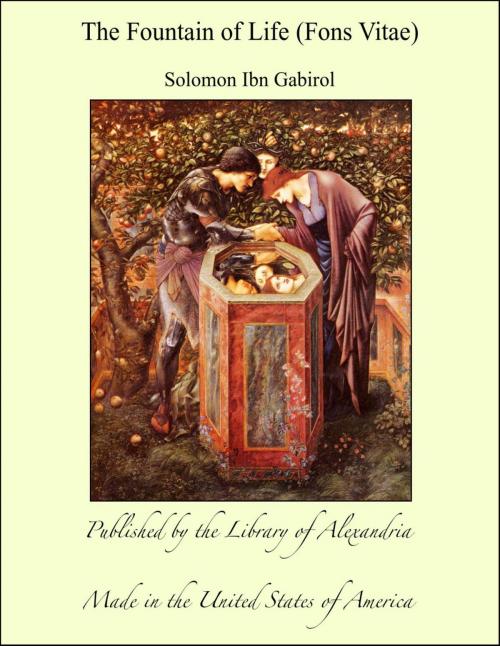The Fountain of Life (Fons Vitae)
Nonfiction, Religion & Spirituality, New Age, History, Fiction & Literature| Author: | Solomon Ibn Gabirol | ISBN: | 9781465577719 |
| Publisher: | Library of Alexandria | Publication: | March 8, 2015 |
| Imprint: | Language: | English |
| Author: | Solomon Ibn Gabirol |
| ISBN: | 9781465577719 |
| Publisher: | Library of Alexandria |
| Publication: | March 8, 2015 |
| Imprint: | |
| Language: | English |
The Fons Vitae of Solomon Ibn Gabirol (1021-1058/70) is essentially an eleventh century attempt to present the first part of wisdom as the source of life for the intellectually oriented Jews of the Western world. As such it suffered almost complete sterility right from the start. Written in Arabic, it seems to have by-passed the greater majority of Gabirol's own Jewish contemporaries. And, even when translated in the twelfth century into Latin by the combined efforts of Ibn Daud (Avendehut), who is better known by his assumed Christian name of John of Spain, and Dominic Gundissalin it was not immediately recognized as a work in medieval Jewish philosophy. This was probably due to the fact that the author of this work was designated by the Arabic form of his name: Avicebron. The florilegia selected and translated into Hebrew by Shem Tob Fahquera (1225-1290) made scant impression on his contemporaries, if we can judge from the fact that only one manuscript of it seems to have been circulated. another fundamental reason for its lack of influence on the Jewish world may be the fact that Gabirol never betrays his Jewish commitments by the insertion of biblical phrases or references to the vast literature of Talmudic developments. Indeed, the neo-platonic linguistic structures and their somewhat Christian adaptations made his work appear positively non-Jewish. Abraham Ibn Daud (ca. 1110-1180) actually criticizes Gabirol for treating such an important topic, that has so many religious implications, in a purely rationalistic way and, also, for expressing teachings apparently dangerous to Judaism itself. Later evaluations bring out the obvious lack of an appealing style, quite unexpected in a work by one recognized as pre-eminent in poetry.
The Fons Vitae of Solomon Ibn Gabirol (1021-1058/70) is essentially an eleventh century attempt to present the first part of wisdom as the source of life for the intellectually oriented Jews of the Western world. As such it suffered almost complete sterility right from the start. Written in Arabic, it seems to have by-passed the greater majority of Gabirol's own Jewish contemporaries. And, even when translated in the twelfth century into Latin by the combined efforts of Ibn Daud (Avendehut), who is better known by his assumed Christian name of John of Spain, and Dominic Gundissalin it was not immediately recognized as a work in medieval Jewish philosophy. This was probably due to the fact that the author of this work was designated by the Arabic form of his name: Avicebron. The florilegia selected and translated into Hebrew by Shem Tob Fahquera (1225-1290) made scant impression on his contemporaries, if we can judge from the fact that only one manuscript of it seems to have been circulated. another fundamental reason for its lack of influence on the Jewish world may be the fact that Gabirol never betrays his Jewish commitments by the insertion of biblical phrases or references to the vast literature of Talmudic developments. Indeed, the neo-platonic linguistic structures and their somewhat Christian adaptations made his work appear positively non-Jewish. Abraham Ibn Daud (ca. 1110-1180) actually criticizes Gabirol for treating such an important topic, that has so many religious implications, in a purely rationalistic way and, also, for expressing teachings apparently dangerous to Judaism itself. Later evaluations bring out the obvious lack of an appealing style, quite unexpected in a work by one recognized as pre-eminent in poetry.















